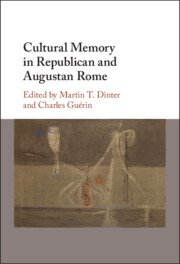Book contents
- Cultural Memory in Republican and Augustan Rome
- Cultural Memory in Republican and Augustan Rome
- Copyright page
- Contents
- Figures
- Contributors
- Acknowledgements
- Chapter 1 Introduction: What is Cultural Memory?
- Part I Writing Cultural Memory
- Chapter 2 War and Cultural Memory at the Beginnings of Latin Literature
- Chapter 3 Creating Roman Memories of Plautus
- Chapter 4 Comedy and Its Pasts
- Chapter 5 Semper Manebit: Poetry and Cultural Memory Theory in Cicero’s De Legibus
- Chapter 6 Varro and the Re-foundation of Roman Cultural Memory Through Genealogy and Humanitas
- Chapter 7 Cultural Memory, from Monument to Poem: The Case of the Temple of Apollo Palatinus in the Augustan Poets
- Chapter 8 Monumenta and the Fallibility of Memory in the Odes
- Chapter 9 Constructing Cultural Memory in Ovid’s Fasti: The Case of Servius Tullius and Fortuna
- Part II Politicising Cultural Memory
- Part III Building Cultural Memory
- Part IV Locating Cultural Memory
- Bibliography
- Index Locorum
- Index
Chapter 9 - Constructing Cultural Memory in Ovid’s Fasti: The Case of Servius Tullius and Fortuna
from Part I - Writing Cultural Memory
Published online by Cambridge University Press: 27 April 2023
- Cultural Memory in Republican and Augustan Rome
- Cultural Memory in Republican and Augustan Rome
- Copyright page
- Contents
- Figures
- Contributors
- Acknowledgements
- Chapter 1 Introduction: What is Cultural Memory?
- Part I Writing Cultural Memory
- Chapter 2 War and Cultural Memory at the Beginnings of Latin Literature
- Chapter 3 Creating Roman Memories of Plautus
- Chapter 4 Comedy and Its Pasts
- Chapter 5 Semper Manebit: Poetry and Cultural Memory Theory in Cicero’s De Legibus
- Chapter 6 Varro and the Re-foundation of Roman Cultural Memory Through Genealogy and Humanitas
- Chapter 7 Cultural Memory, from Monument to Poem: The Case of the Temple of Apollo Palatinus in the Augustan Poets
- Chapter 8 Monumenta and the Fallibility of Memory in the Odes
- Chapter 9 Constructing Cultural Memory in Ovid’s Fasti: The Case of Servius Tullius and Fortuna
- Part II Politicising Cultural Memory
- Part III Building Cultural Memory
- Part IV Locating Cultural Memory
- Bibliography
- Index Locorum
- Index
Summary
Ovid reinvented Roman cultural memory by re-constructing the memories of Servius Tullius, the sixth mythical king of Rome. In so doing, he joined historians, antiquarians, poets, and even the emperor Augustus in their efforts to rebuild and recover the Roman past.1 Furthermore, Ovid commemorated their collective endeavours in the Fasti, a didactic poem which discusses the aetiologies of Roman festivals (fasti) and highlights how Augustus appropriated Rome’s calendar by filling it with festivals dedicated both to his own achievements and those of his family, the domus Augusta.
Keywords
- Type
- Chapter
- Information
- Cultural Memory in Republican and Augustan Rome , pp. 151 - 166Publisher: Cambridge University PressPrint publication year: 2023

